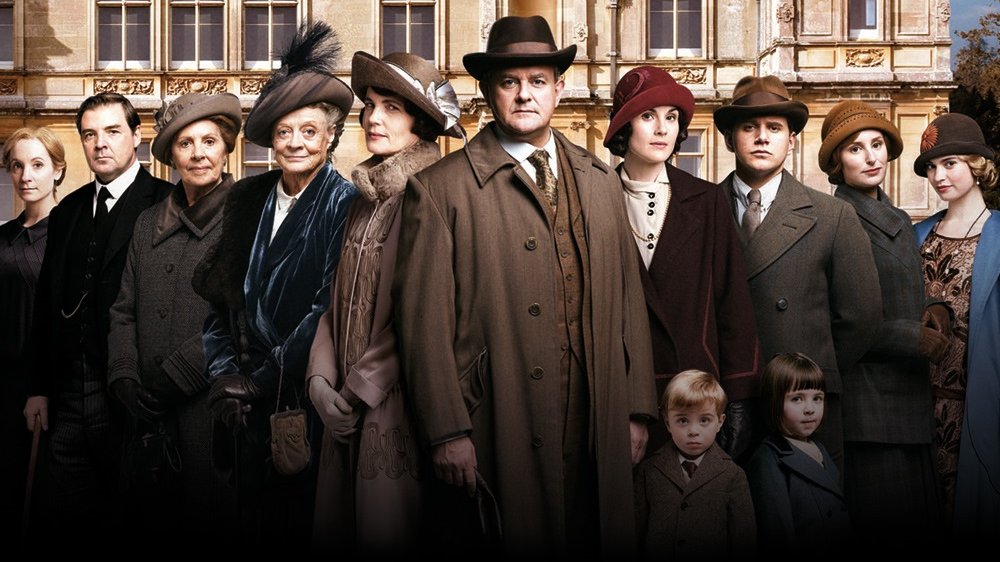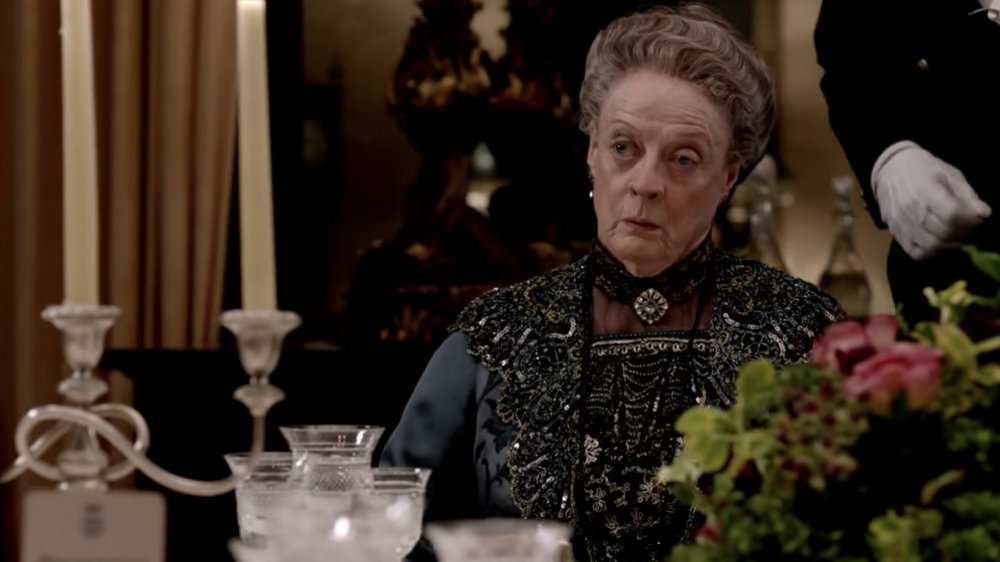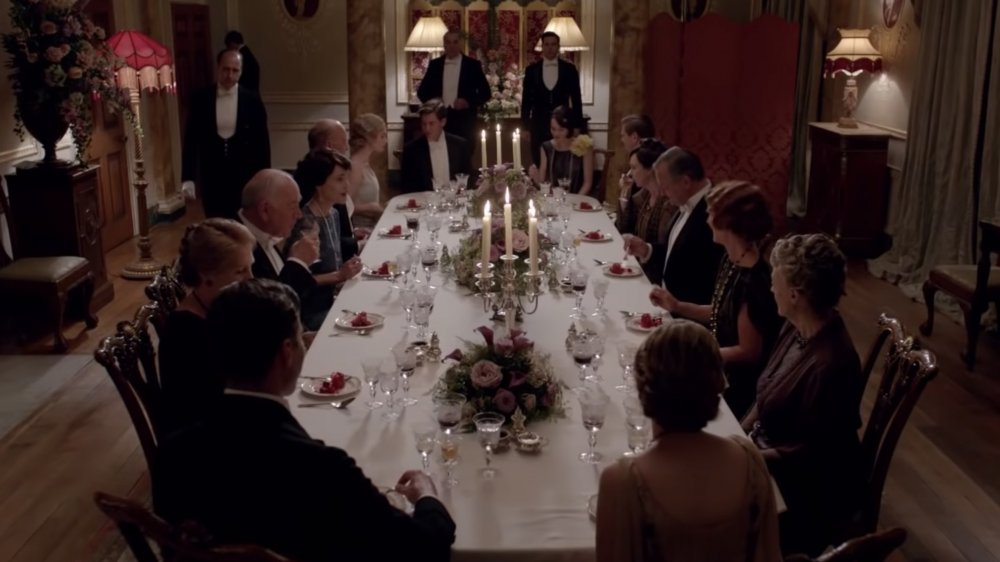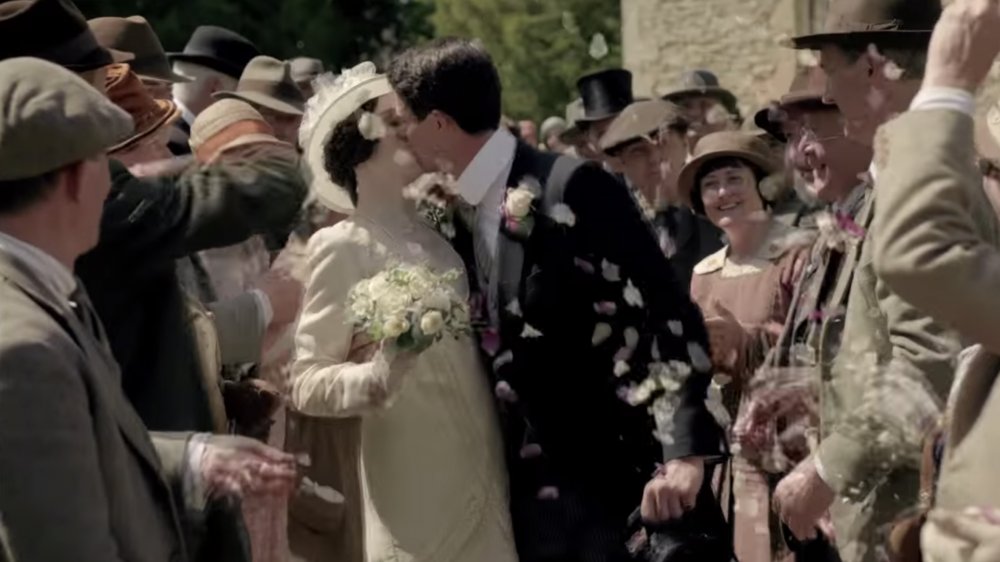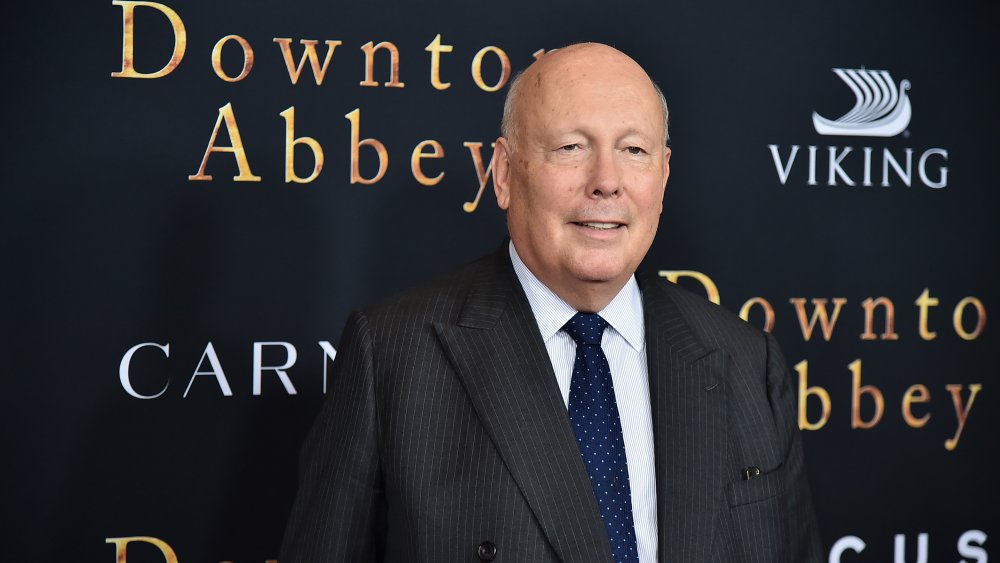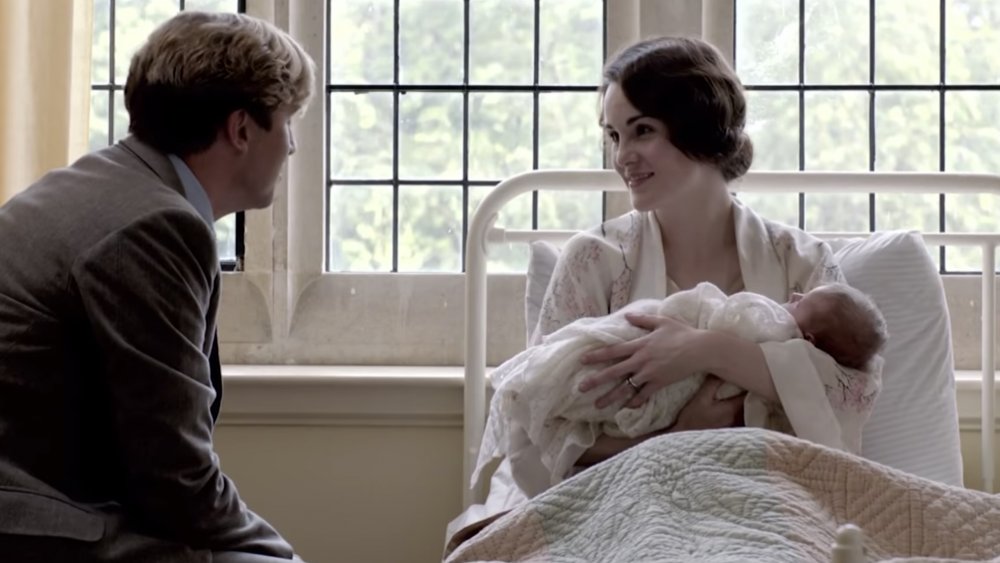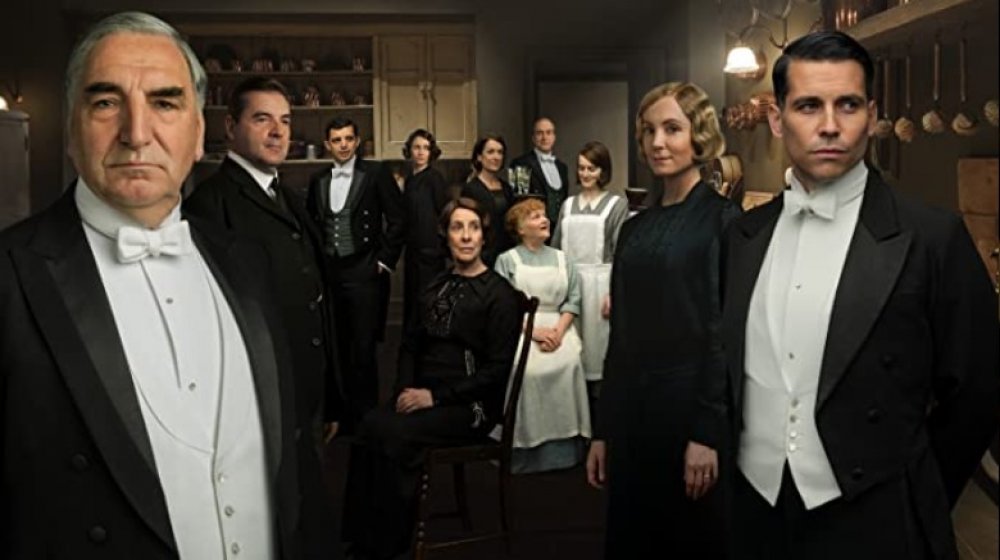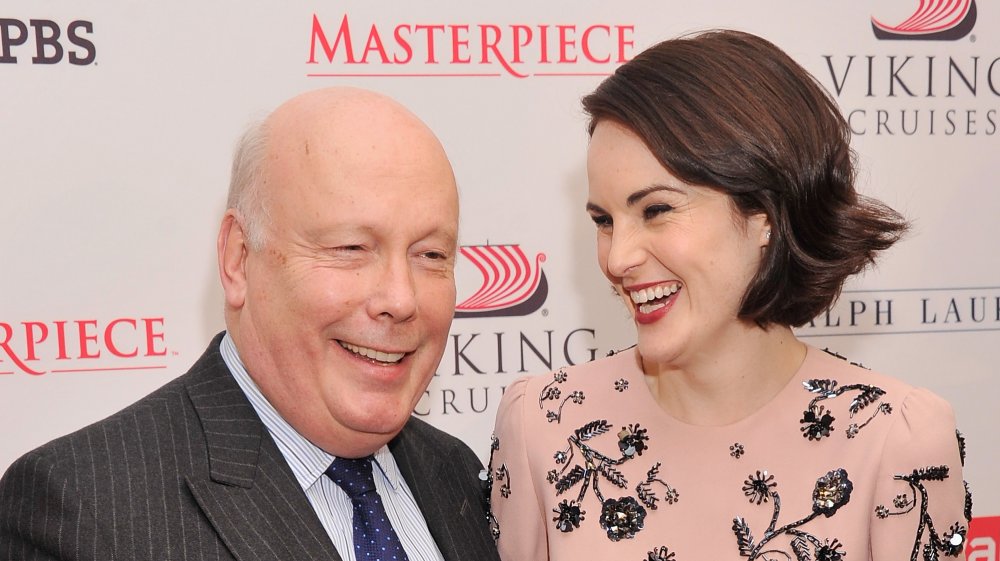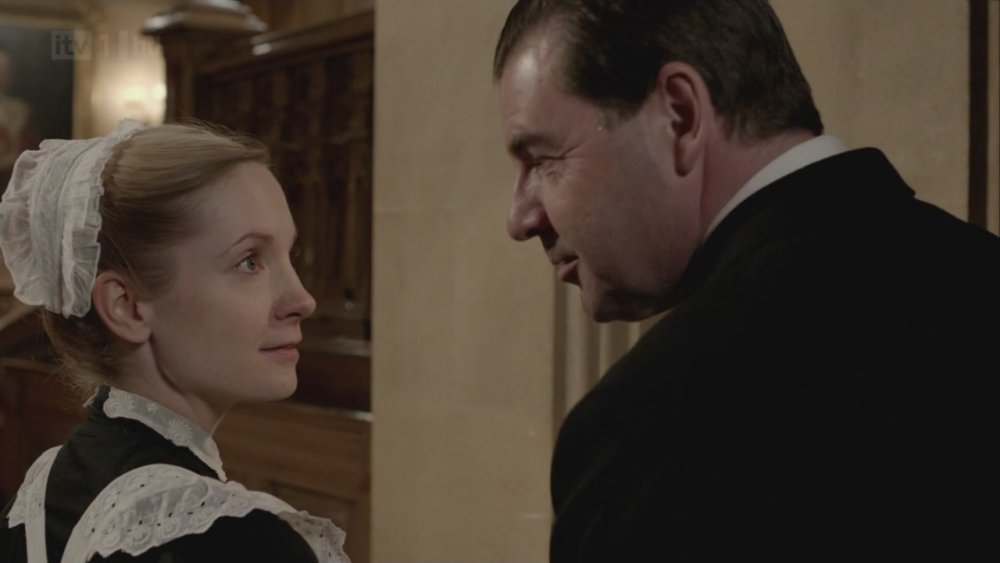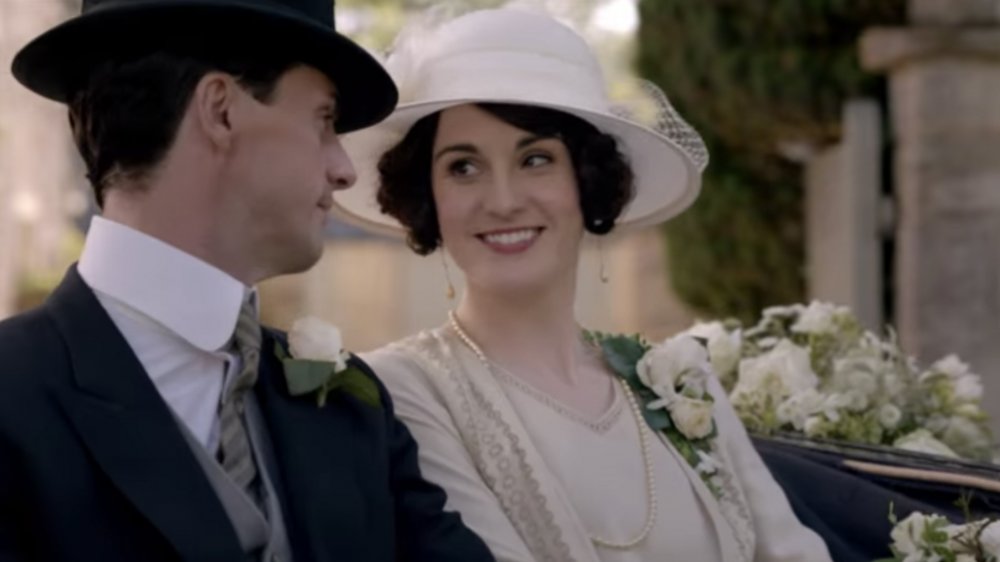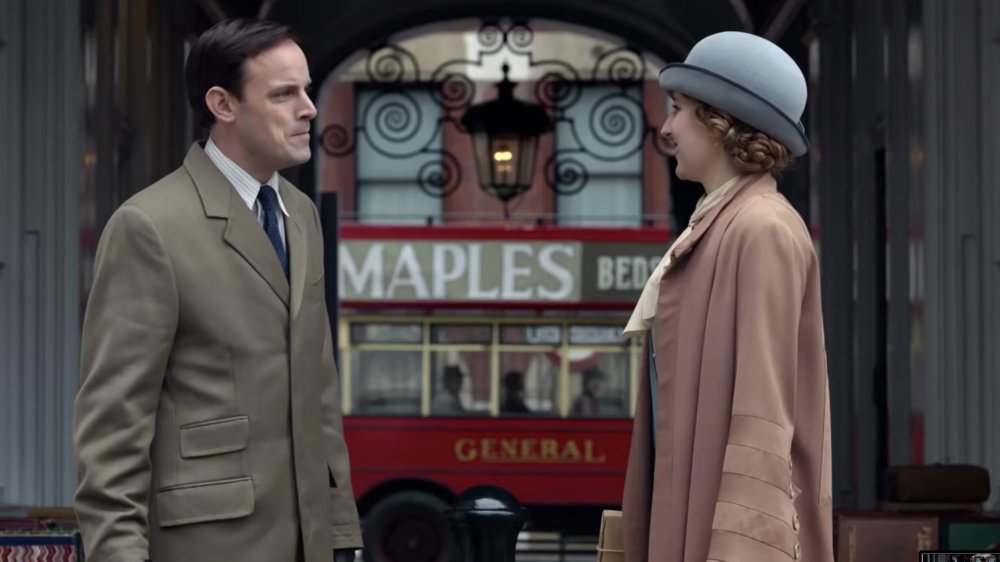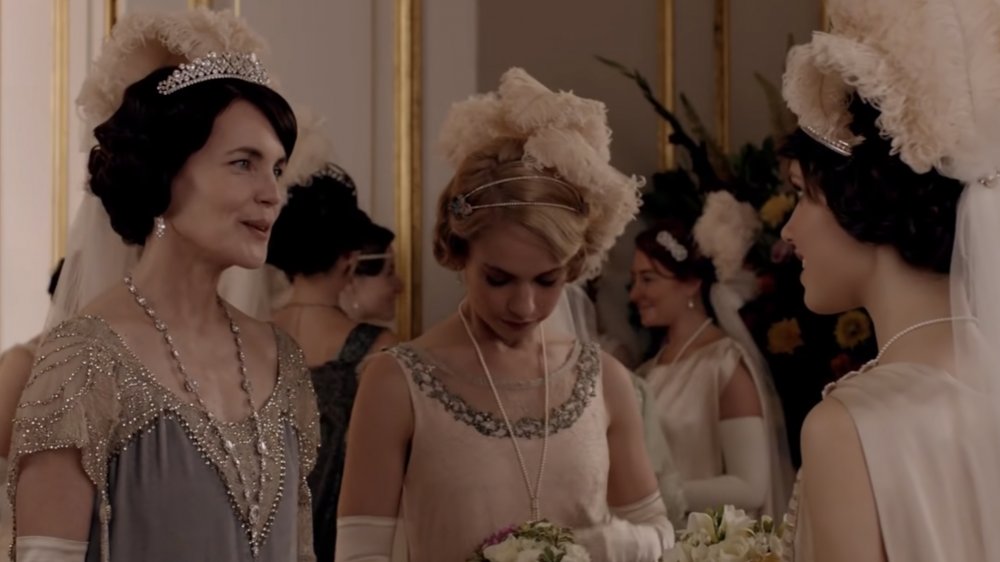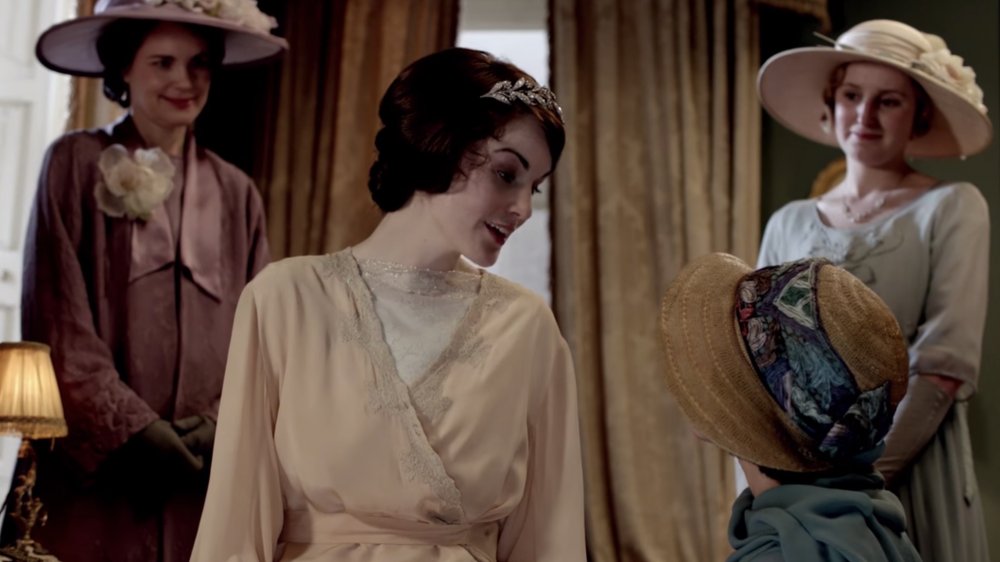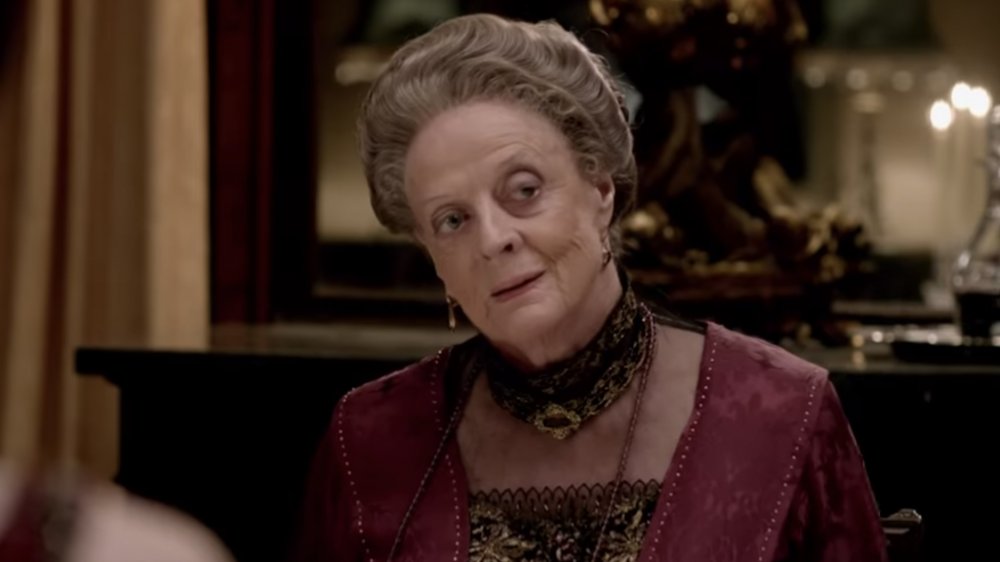The Real Reason Why Downton Abbey Was Canceled
Downton Abbey quietly premiered in the United Kingdom in 2011. At the time, no one could have expected just how big of a phenomenon it would become. However, 69 Emmy nominations and 15 wins later, it's never been more apparent just how much of an impact the show made. According to Rotten Tomatoes, the show was reviewed extremely positively, and, even as it was still airing, creator Julian Fellowes wrote that the series had big-screen potential. Given all of that, how and why exactly did the show get canceled?
Ultimately, the choice was simply made that it was the end; the characters found their happy endings, the elaborate plot lines were resolved, and fans were forced to say goodbye to Downton. More than one factor contributed to that fateful decision to end the show, though, ranging from main cast members deciding they were finished to the show's own creator having reservations. Here's a detailed look and the real reason the series was canceled.
Maggie Smith didn't want to come back to Downton Abbey
Downton Abbey is a show that's built around an ensemble of characters. Even so, certain members of Downton form the center of the show: Mary Crawley, Mr. Bates, Branson, and, of course, the Dowager Countess. The Crawley matriarch was truly the heart of Downton. Without Maggie Smith as the Dowager around to dole out wisdom (and gossip), the show wouldn't be the same.
In an interview with The Sunday Times (via Vanity Fair), the Downton star announced she would leave the show after its sixth season — before PBS announced it would also be the show's final season. Smith told The Sunday Times her role on Downton ruined any shred of privacy she had, noting that she could no longer leave her home without being recognized: "What's sad is I've gone through my whole life without any of that. I could go round galleries and things on my own and I just can't do it now."
While Smith announced she'd be leaving after the sixth season as the fifth one came to a close, show creator Julian Fellowes was telling outlets that he didn't know if Downton Abbey would be canceled or not, according to Vanity Fair.
The Crawleys' lifestyle was in decline on Downton Abbey
Throughout Downton Abbey's run, the abbey faced all sorts of issues. Lord Grantham blew all of the estate's money on a bogus railway investment, failed to keep up with modernization, and, at several points, pondered shutting down Downton and moving his family altogether, Vulture recapped.
In 1926, when Downton's final season takes place, the U.K. General Strike led the working class to fight back against the aristocratic system that depended on them for cheap labor, according to Time. This, coupled with the fact that World War I opened up more opportunities for women, led estates like Downton Abbey to lose their workforce.
"These houses were designed to be served by an army of cheap labor and certainly by 1930, there's a problem in getting domestic staff for a house," Adrian Tinniswood, author of The Long Weekend: Life in the English Country House Between the Wars, told the publication. And, if keeping staff wouldn't be difficult enough for the Crawleys, Time also reported that estates like Downton Abbey became more and more expensive to operate due to increasing taxes. Filming this decline would've made for vastly different seasons if Downton Abbey hadn't been canceled.
The characters on Downton Abbey had completed their story arcs
For five seasons, fans of Downton Abbey watched diligently as the characters navigated complicated personal lives while doing their best to save their perpetually-at-risk estate. After so many years, however, there's only so much an audience can take of Mary juggling suitors, Edith facing setback after setback, or of Downton seemingly being on the brink of going under at any given moment.
By the end of Season 5, according to Bustle, many of the struggles Downton Abbey's characters faced had all but been tied up in a neat little bow. Edith escaped to London to finally live with her daughter, Mary said goodbye to the two suitors who never stood a chance, and Anna and Mr. Bates were finally reunited. Everything that happened after all of that in Season 6 was simply icing on the cake. Arguably, the show could have ended after the fifth season, with a majority of the characters seemingly in a happy place.
The creator didn't want Downton Abbey to become worn out
The Downton Abbey fan base became used to — and perhaps grew to love — the roundabout storylines that seemed to grow crazier and crazier with each new episode (at one point, fans will remember, Anna Bates even ends up in prison). But there's only so long a show can go on without tiring out its audience with what are essentially the same storylines with a fresh coat of paint each season.
In a letter to American fans of Downton Abbey published by PBS, show creator Julian Fellowes admitted that "the series is ending and that decision will not be reversed." He continued, writing, "We wanted to leave while we would still be missed and not wait until everyone was dying to see the back of us." Fellowes knew that dragging on the show was not the way to go. Though the plot lines did drag out in certain areas, fans could be happy with how the show ended, rather than say "it's about time" as the credits rolled.
Downton Abbey had lost several main characters already
In the first three seasons, fans watched Mary and Matthew Crawley go from hating each other to falling in love, getting married, and having a baby. However, Matthew and Mary's happy ending was short-lived. According to Town And Country, actor Dan Stevens, who played Matthew, chose not to renew his contract after the first three seasons. Julian Fellowes told Radio Times, however, that he didn't know Stevens wouldn't return until Season 3 was well underway.
That same year, Downton Abbey also lost Jessica Findlay Brown, who played Sybil Crawley. According to Fellowes, Findlay Brown was upfront from the beginning about her intention to stay for just three seasons. After both Stevens and Findlay Brown left, Downton Abbey did find its footing once again. However, when Season 5 ended, two other characters said their goodbyes.
Downton executive producer Gareth Neame told Deadline that the departures of Allen Leech, who played Tom Branson, and Lily James, who played Rose MacClare, left the door open for an eventual return. Still, losing four main characters in just five seasons is a lot for any show so it's no wonder the showrunners knew it was the right time to close the curtain and cancel the series.
Downton Abbey was bound to hit the big screen
Downton Abbey, the movie, was a long time coming. In a goodbye letter to fans after the series ended in 2015, creator Julian Fellowes revealed, "There may be a movie — I hope there will be — and there may be a stage play or a musical. I have heard all of them mooted." Right he was.
About two years after the series ended, the Downton Abbey movie was set to begin production, AP News reported. At the time, Michael Edelstein, NBCUniversal International Studios president, said the movie had been "in the works for some time." On the same press tour, series star Laura Carmichael, aka Edith Crawley on the show, and series creator Julian Fellowes both shared excitement for the film.
So, while the series may have ended after six seasons, it was clearly never really the last fans would see of Downton. With a show that focuses on its characters (and setting) just as much — if not more — than plot, there can always be another story to tell.
The creator almost left Downton Abbey in 2013
In 2012, Downton Abbey bade adieu to stars Dan Stevens and Jessica Brown Findlay, who played Matthew Crawley and Sybil Crawley, respectively. As if those losses weren't enough, show creator Julian Fellowes hinted that a new project could pull him away from Downton Abbey in an interview with The New York Times conducted just a year later.
At the time, Fellowes told the reporter that while he would hope not to have to begin work on the NBC series The Gilded Age until Downton was finished, it wasn't realistic for him to do both shows at the same time, Fellowes explained, "I would hope that by the time all the hurdles have been cleared, the timing makes it so I can then concentrate on the new series. And if Downton goes on — of course that's not my decision — then it would be with other writers."
While handing over the reigns of Downton to other writers was a very real possibility Fellowes faced, he did explain to The New York Times that he'd "prefer to do everything on [his] terms." Luckily for Downton fans, Fellowes' project didn't pick up steam until well after Downton Abbey ended.
The storylines in Downton Abbey became forced
In the early days, as The Guardian pointed out, Downton Abbey focused on the intricate details of everyday life at Downton, like the mystery of a missing wine bottle or sisterly tension. But, in Season 2, all the minutiae started getting tossed aside in favor of larger-than-life plots that feel out of place in the slow-moving world of English aristocracy fans were initially introduced to.
According to The Atlantic, the show really seemed to lose its footing once the main characters were settled into their respective relationships — and that's when some of the more convoluted storylines entered the fold.
Throughout the course of the show, characters were forced into situations that grew increasingly unrealistic. Mr. Bates and his wife, the sweet-to-a-fault Anna, are both accused of murder and Matthew Crawley miraculously recovers from being paralyzed from the waist down. Later on, Edith has a baby with a man who goes missing while trying to divorce his wife, as Time recapped. Despite all this, fans tuned in season after season.
Did Downton Abbey want to end on a high note?
In an interview with The New York Times, Downton Abbey creator Julian Fellowes said, "My own belief is that these things have a life. And one of the tricks is to recognize when it's time to come to an end." After six seasons, it was Downton Abbey's time.
According to the Downton Abbey page on Rotten Tomatoes, the show was generally well-received throughout its entire run. However, after an astounding 100 percent approval rating for Season 2, the show lost its way. The convoluted storylines aren't just the opinions of one or two scorned reviewers who had a bone to pick with the show. In Season 3, critics agreed that the show's plots became unsatisfactory. The fourth season of Downton Abbey earned a 73 percent, proving it was disappointing compared to earlier seasons.
Season 4, however, proved to be Downton's lowest point as the fifth and sixth seasons received an 82 percent and 91 percent rating, respectively, showing that if anything, the show definitely ended during one of its highs before potentially veering off track again.
Historical dramas like Downton Abbey aren't designed to be long-running
Downton Abbey is cemented in a very specific place and time: an English aristocratic house in the early 20th century. The setting alone presents an issue faced uniquely by historical dramas. That is, a race against the progression of history.
As noted by Time, the Crawleys' way of life was very much on the way out in the real timeline of historical events. The show spanned 12 years, beginning in 1912 and ending in 1924. Had the show continued on past its sixth season, the Crawleys would have been taken well into the 1930s, at which point it would have been difficult to believe Downton as an estate would have survived at all. Given the struggles the fictional estate already faced combined with the Great Depression that lasted from 1929 to 1933, it's unlikely Downton would come out unscathed.
In fact, Time reported that many places like Downton were completely demolished as staffing and maintaining them became at best, difficult, and at worst, downright impossible. Unfortunately, historical dramas like Downton Abbey are just not meant to carry on for ten or more seasons like shows with modern settings. Inevitably, time catches up to them.
Downton Abbey was criticized for glorifying the aristocracy
Though Downton Abbey was a widely beloved show, as its Rotten Tomatoes reviews prove, it wasn't without its critics — some of whom pointed out that the show presents an idealized version of a time in history when the division between the aristocracy and working class seemed unbridgeable.
One reviewer wrote in The Guardian that Downton Abbey presented the world of early 20th century English aristocracy and servitude as amicable and even "pleasant," and completely ignored the harsh truths of the period. According to one expert the reviewer spoke to, the servants who worked at Downton Abbey would, in real life, be covered in sweat and grime from working all day and never would have had the time to carry out the subplots laid out for them in the show.
As for the Crawleys, their kindness, understanding, and generosity towards the people who worked for them were a far cry from what those relationships were really like. To some, Downton Abbey fails to stand up to modern scrutiny, and instead belongs in a past that didn't care to see the harsh realities of history.
The market for historical dramas like Downton Abbey is oversaturated
According to Smithsonian magazine, audiences love period dramas because they allow us to distance ourselves from the modern world. However, that often means glossing over the very real social issues people face to this day. However, Smithsonian also noted that audiences tend to flock to historical dramas because they display the best parts of history: the fancy clothes, lavish homes, and decadent parties.
It's perhaps because historical dramas are so beloved that there are so many of them out there. Netflix has a whole genre page dedicated to them with shows and movies covering so many parts of history that you'll never get bored. Starz, for their part, has found their footing by producing show after show based on the English Tudor kings.
How does Downton Abbey fit into all of this? In the end, it's but another show in a long list of historical dramas that flood today's streaming services. While the show certainly has its fans, had it continued, it would always have an endless line of shows with which to compete.
The creator felt Downton Abbey was complete
After six seasons, the story of Downton Abbey was simply finished. When viewers said goodbye to the show, every character was seemingly done with their journey. According to Time, Edith finally found love, Mary met her match in Henry Talbot, Carson and Mrs. Hughes got married, and the Downton estate was comfortably modernizing. With all of that settled, what more could the show have done?
According to creator Julian Fellowes, not much at all. He told Deadline, "What happens in the end with any serial drama is there's a limited number of things that happen to human beings." He continued, saying, "And I think, if you stay too long, you start to repeat. Basically: are we happily married? Do we like our job? Are the children doing well? Are our parents OK? I mean, this is all our lives. When you've explored all of those for all the characters, then I think it's time to say goodbye."
And so, with everyone at Downton settled, Fellowes decided it was time to say goodbye. According to The Guardian, that goodbye came with a happy ending for nearly every main character.
